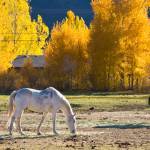Protein Levels and Environmental Impact of Equine Diets

Can your choice of feed for your horse have an effect on the environment? Theoretically, yes, according to the results of research conducted at Michigan State University. One variable, the amount of protein in a horse ration, was of particular interest in a study that compared protein quality and utilization by horses in various feeds.
When dietary protein intake exceeds the horse’s requirement, higher levels of urea are excreted in the urine. Bacteria in the environment can produce ammonia from urea. Ammonia fumes in stall bedding are irritating to the horse’s respiratory tract. In an outdoor setting, ammonia could theoretically contaminate groundwater. The focus of the study was determining which feed would meet a horse’s protein requirement without leading to high levels of nitrogen excretion.
Six mature Arabian geldings in a moderate exercise program were used in the study and were fed different diets in a sequential pattern so that each horse ate each diet. Diets were timothy hay; timothy hay and a small measure of oats; timothy hay and a larger measure of oats; early-bud alfalfa hay; early-bloom alfalfa hay; and mid-bloom alfalfa hay.
A complete collection of urine and feces was conducted during the last three days of each treatment and daily nitrogen excretion was determined. A blood sample taken on the last day of each treatment was used to find amino acid concentrations and figure nitrogen utilization.
Results showed that nitrogen digestibility was greater for horses fed alfalfa than for those fed timothy. Using alfalfa that was less mature, and therefore had a lower percentage of indigestible fiber, led to horses ingesting more protein than was necessary to meet requirements. This led to increased urinary nitrogen excretion. The diet that included oats and timothy hay met protein requirements, did not increase nitrogen excretion, and improved apparent nitrogen digestibility.
These findings support the idea that many horses get along well on grass hay and a small amount of grain. So should you stop feeding alfalfa hay? Not necessarily! Each horse’s requirements for protein, fiber, energy, and other dietary components depend on many things such as the horse’s age, weight, stage of growth, exercise program, and overall health status. A qualified equine nutritionist can answer questions about the best choices for hay and grain to meet the unique needs of a particular horse.








